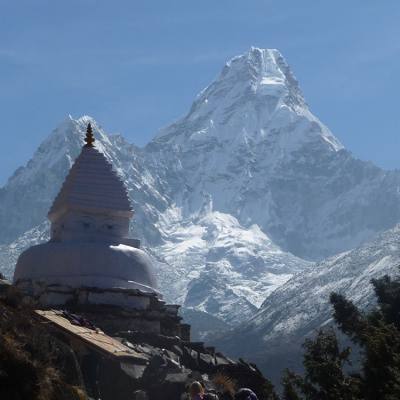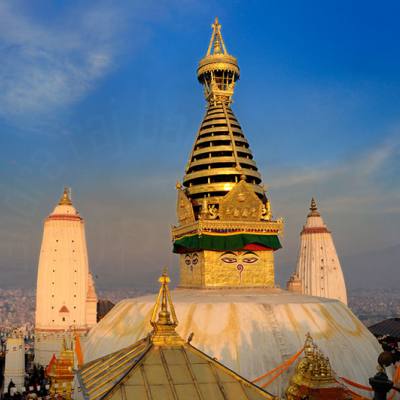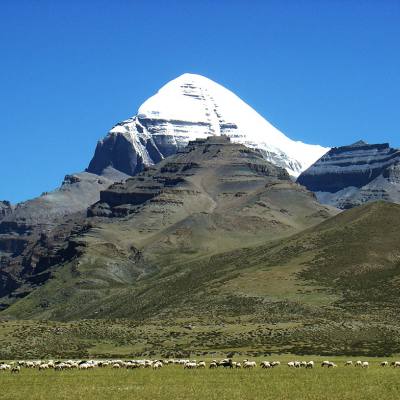Bhutan – natively called ‘Druk Yul’ (Land of the Thunder Dragon) is regarded as the last paradise on earth. Its isolation from the modern world, spectacular mountains, wide range of flora and fauna, age-old Buddhist culture, vibrant traditions with mystic aura have made it a real ‘Land of the Thunder Dragon’.
Although Bhutan is small in size (47,000 sq. km. with a population of 600,000 only), its topography offers dramatic contrast ranging from its southern border of 300 m to the height of 7,000 m Himalaya in the north bordering with the Tibetan plateau of China, encircled by the Indian states of West Bengal and Assam in the south and Arunanchal Pradesh in the east.
Bhutan is a magical little Buddhist kingdom of enchanting people set high up in the Himalayas between India and China. Bhutan was untouched by the outside world until just a few years ago when television and internet were finally allowed in; visiting the country still feels like going back in time and entering another universe far, far away. The proud people hold on fiercely to their rich cultural heritage, and they dress in traditional gho and kira robes as they have for centuries. Every building follows the charming old-fashioned architectural style, so walking down the streets feels like entering a child's fairytale book. Bhutan is a remote Eden like none other on this planet - a McDonald's or Starbucks is absolutely unfathomable - and it hopefully will retain its Arcadian charm indefinitely.
Remote Lands immerse you in Bhutanese culture by providing ousiders an access to private events and extraordinary people. Our decade old experience introduces you to a multi-faceted representation of remarkable people, from government dignitaries and intellectuals to remote villagers and farmers. Your interactions with these people will be stimulating, edifying and enlightening, and you will have a well-rounded and profound learning experience that you will value forever.
Visit Bhutan with us, you will be fascinated!
LANGUAGE
Dzongkha, the language of the dzong, is the national language of Bhutan which has its origin from the Tibetan language. However, Nepali language is well spoken and understood throughout the country.
FLORA & FAUNA
Bhutan, traditionally called a botanical heaven, where the valuable flora like blue poppy (national flower), rhododendron, junipers, magnolias, rare orchids, edelweiss, gentian, giant rhubarb, high altitude plants like yarsa gomba, etc. are naturally well grown and being used for the medicinal and herbal purposes for centuries.
Bhutan is also the paradise for the rare and exotic fauna like rare golden languor, red panda, rare black-necked cranes, snow leopard, takin, musk deer, Himalayan brown bear, Himalayan marten, tiger, mountain goats, blue sheep, Hornbills, pheasants, etc.
ADVENTURE
Trekking, mountaineering and biking are the popular adventure activities in Bhutan.
ACCOMMODATION
Modern hotels are available in Thimpu and Paro, while in the outlying parts, comfortable resorts and lodges are available.
In Thimpu, Paro, Punakha, high category hotels (5 STAR & 5 STAR DLX) are also available.
UMA PARO RESORT in PARO
TASHI TAJ HTL in THIMPU
AMAN KORA RESORT
Note: Aman Kora Resort is also available in Punakha, Gangtey and Bumthang, but small ones with 12 sphisticated rooms at a very high tariff of around US$ 1,200 per night for a double room on full board basis.
CLOTHING
Due to wide range of temperature and climatic conditions, it is advisable to bring appropriate clothing. From May to September normal traveling cloths plus a light woolen sweater or a light jacket and a light walking boots are sufficient. From November to end of April on the other hand, you will need very warm clothes including underwear or woolen tights to wear under trousers, thick socks, strong boots and down jacket.
You will be offending people if you walk around in skimpy or tight fitting clothes. Although there are normally opportunities to wear skirts or loose trousers, men should not wear singlets. During visit of monasteries, dzongs and other religious sites, you should not wear shorts and hats.
The following is a fairly exhaustive list of what you should pack for the trip:
Clothes as per season, sunglasses/spare glasses or contact lenses, pair of casual shoes, washing kit, shaving kit, towel, hat umbrella, camera, film and accessories, maps, insect repellent, hand cream, small sewing kit & safety pins, torch or flash light with spare batteries, mirror, sun screen cream, lip salve or soluble aspirin, antiseptic cream, preparation for the relief of sunburn. You may not be tuned to the Asian drugs so it is always better to bring own brand.
Currency
Bhutan's unit of currency is the ngultrum (Nu), which equals 100 chetrums. It is at par with the Indian rupee, itself a legal tender in the kingdom. One US dollar is exchanged for roughly 44 Ngultrums. Tourists can exchange traveller's cheques or cash at the Bank of Bhutan or at their hotels. American or Australian dollars, pound sterling, Hongkong dollars, Singapore dollars, Thai bath or Japanese yen are all accepted currencies.
Things to Buy:
Thangkas
Thangkas are Buddhist paintings, usually on canvas. Traditionally, they are mounted on a background of brocade and hung by a stick sewn across the top. You can also buy an un-mounted painting.
Textiles
Hand-woven cotton fabric is the most traditional and useful item you can buy in Bhutan. The quality is almost always good, but the price will vary depending on the intricacy of the design and whether any expensive imported silk is used in the weaving
Other items
Brass statues and Buddhist ritual items, such as bells, cymbals, trumpets and dorjees are available form specialist shops. Jewellery and other silver items are best purchased from a reputable shop or from the artisans themselves. Excellent wood pieces can be bought. Useful items such as picture frames and furniture is available, as are wooden masks similar to those used in the tshechu dances. Wooden bowls, either plain or lined with silver, are a specialty of eastern Bhutan.
Bamboo work is available in most of the handicraft shops and sometimes at roadside stalls. The round bangchung baskets are a typical Bhutanese item. Another unusual item are the large bamboo pipes covered with weaving that is used for carrying local liquor.
Handmade paper: is available in large sheets and is packaged into handy packets of letter-writing size.
Carpet manufacturing: is a recent innovation in Bhutan.
Handicrafts: Bhutan boasts a variety of high quality handicrafts.
Customs and Regulations:
Custom Regulation: The Bhutanese authorities strictly prohibit the export of any religious Antiquity or antiques of any type. All personal electronics, Cameras, Video Cameras, Computers and personal electronic equipment may be brought into the country but they must be listed on the customs form provided on arrival at Paro and will be checked on departure. Two liters of Alcohol and reasonable quantity of cigarettes may be brought in to the country without duty.
Post and Communications
The Bhutanese postal system is reliable, you can send mails from hotels and post offices and no special procedures are necessary. If you mail cards or letters from the Thimphu post office, you can buy exotic Bhutan postage stamps from the philatelic bureau and use them on your letters and postcards. Bhutan Post offers outgoing EMS [expedited mail service], which is a reliable and fast international mail delivery facility that is cheaper than courier services. It also has a LUM [local urgent mail] service for delivery within Bhutan. DHL is the only international courier to operate from Bhutan.
Most of the country’s major towns have both domestic and international direct dial facilities including 3G mobile phone services. 3G SIM can be easily bought in the major cities/ Nearly all tourist standard hotels and restaurants have WI-FI services.
Photography and Filming:
The photography opportunities on a trip are immense. Photography is permitted nearly everywhere in Bhutan and the local population has no aversion to being photographed. If you wish to record the local population, their houses, shops etc, always ask by gestures if it is okay to do so. Photography inside the Dzongs and Monasteries are not permitted. Please follow your guide's instruction carefully while visiting Dzongs, monasteries and religious institution.
Of late, the Royal Government encourages the filming groups. Any commercial Filming must pay a royalty to obtain the permit from the Royal Government of Bhutan. We will assist you to get the permit.
Filming royalty: All proposals for filming are subjected to payment of a royalty at the following rates:
Duration of the final Edited version Amount in (US dollars)
First 30 minutes or part thereof 10,000.00
Next 30 minutes or part thereof 6,000.00
Every additional30 minutes or part thereof 3,000.00
Food and Drinks
Bhutanese food is a tantalizing blend of hot Himalayan flavours. Northern Indian cuisine mixes with the chillies of the Tibetan plateau and traditional recipes from Bhutan’s villages to create sizzling and memorable tastes. Chanterelle mushrooms, apricots, asparagus, a wide variety of chillis and a host of spices grow in abundance in Bhutan’s valleys.
These spices, fruits and vegetables are prepared with beef, chicken, pork, and dried yak or with each other to make dishes that resemble elements of both Chinese and Indian cuisine. Bhutanese dishes are traditionally served with ample portions of indigenous red rice. The food prepared for tourists is tempered to western taste. The tourism authority imported the knowledge of selected European hotel experts to improve the quality of food and beverage.
RESERVATION & BOOKING
Minimum of 2 weeks in advance, a firm booking with full payment along with full passport details (Full name, Nationality, Passport No., Date of Birth, Profession and Home Address) should reach us. We process Bhutan visa ourselves. However, a firm booking is advised well in advance of 1 month so as to enable us to confirm air seat, hotels and visa on time.
CANCELLATION
1) There shall be cancellation charges on the tour booked
- Within 21 days from the date of tour: 10% of the price
- Within 14 days from the date of tour: 15% of the price
- Within 7 days from the date of tour: 30% of the price
- Less than 7 days from the date of tour: 50% of the price
- After arrival in Bhutan: 100%.
The cancellation regualtion will be as follows on air tickets.
Once the ticket is issued, it will not be subject to refund or change of the passenger’s name, except the date of flight.
It can be re-used within the same calendar year, if the same passenger is traveling in the same sector.
COST & WHAT IS INCLUDED
Normally, Bhutan tour cost is calculated in terms of 2 categories of hotels: A & B categories.
A-category hotels are taken as deluxe hotels, B-category hotels as middle class (standard) hotels. Cost shall be made available to you upon request on the basis of the respective hotel category. Beside, if you wish to have even much higher category hotels, please write to us. However, please note the higher category hotels are available only in Thimpu and Paro, not in the outlying parts of Bhutan.
Services Included In The Cost:
Twin sharing room in the respective hotels, All meals (3 meals), Overland transportation within Bhutan (Japanese car/van/mini-coach as per group size), sightseeing as per itinerary with a good English speaking guide, necessary airport/hotel/airport transfers, Bhutan visa fee and Tourism Development Fee (TDF).
During trekking, accommodation in the best quality tents, all meals, air pillows, sheet, hot water bottle, dinning tents, kitchen tent, toilet tents, etc. backed by our skillful and experience camping crew.
Cost Does Not Include:
Airfare, airport taxes, All Insurance, Nepal re-entry visa fee, drinks at hotels, personal expenses such as drinks, laundry, tips, etc
RISK & LIABILITY
Tibet Kailash Treks (P) Ltd. Always puts its all efforts in making your journey smooth and pleasant. However, as all tours/treks are run strictly under the Tourism Authority of Bhutan (TAB). Ying Yang Holidays or its agents shall not be held responsible for any changes or cancellation of tours due to any unavoidable circumstances such as road blockade, flood, snow, unrest, cancellation of flight, delayed arrival of clients or no show, sickness, accidents, break down of vehicles, etc. Any extra cost incurring thereof shall be borne by the clients on the spot. So, it is most advisable that clients should have full insurance against tour cancellation and personal accidents.
NOTE:
a) April & October months are the best months to visit Bhutan. Normally, these 2 months are full of festivals with excellent weather. Please check the festival list so as to match your tour wish festivals in Bhutan.
b) For trekking in Bhutan, a minimum of 2 pax is a must. For the normal tour, even one person can take the culture tour.

 98510 22507 (Mahendra)
98510 22507 (Mahendra)
 tktreks@gmail.com
tktreks@gmail.com



